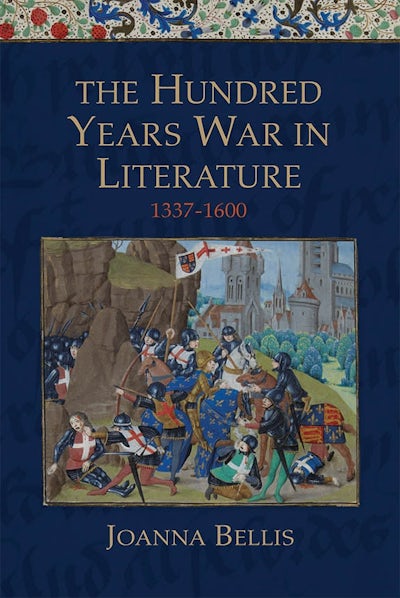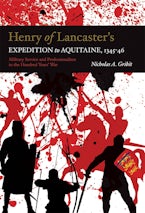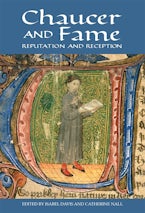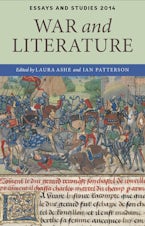
The Hundred Years War in Literature, 1337-1600
- Description
- Contents
- Reviews
An analysis of texts narrating the Hundred Years War, from contemporary accounts to the sixteenth century.
The Hundred Years War was central and paradoxical for the writing of English history, simultaneously galvanising pugnacious articulations of nationalism and exposing their bankruptcy. However, the conflict remains a sticking pointin scholarship of medieval multilingualism and its complex relationship to nationalism, often overlooked in calls for a "post-national" vocabulary.
This book charts the narration of the war in English literature, from contemporary chroniclers and poets, such as Chaucer, documenting the conflict that dominated the fourteenth and fifteenth centuries, to later polemicists and playwrights looking back on their medieval past, including Shakespeare. It explores how its propagandists navigated its cultural minefields, and then how their mythologisations became ciphers for Tudor expressions of nationalism. Challenging the periodisation that habitually divides the medieval from the early modern, it shows how an event of the magnitude and longevity of the Hundred Years War shaped ways of thinking about English history and language from Chaucer and Lydgate to Spenser and Shakespeare. It also brings to light a rich and neglected corpus of Hundred Years War literature, from anonymous chroniclers and balladeers to agonising eyewitness accounts.
Joanna Bellis is the Fitzjames Research Fellow in Old and Middle English at Merton College, Oxford.
The Hundred Years War was central and paradoxical for the writing of English history, simultaneously galvanising pugnacious articulations of nationalism and exposing their bankruptcy. However, the conflict remains a sticking pointin scholarship of medieval multilingualism and its complex relationship to nationalism, often overlooked in calls for a "post-national" vocabulary.
This book charts the narration of the war in English literature, from contemporary chroniclers and poets, such as Chaucer, documenting the conflict that dominated the fourteenth and fifteenth centuries, to later polemicists and playwrights looking back on their medieval past, including Shakespeare. It explores how its propagandists navigated its cultural minefields, and then how their mythologisations became ciphers for Tudor expressions of nationalism. Challenging the periodisation that habitually divides the medieval from the early modern, it shows how an event of the magnitude and longevity of the Hundred Years War shaped ways of thinking about English history and language from Chaucer and Lydgate to Spenser and Shakespeare. It also brings to light a rich and neglected corpus of Hundred Years War literature, from anonymous chroniclers and balladeers to agonising eyewitness accounts.
Joanna Bellis is the Fitzjames Research Fellow in Old and Middle English at Merton College, Oxford.
Introduction
'When the world woxe old, it woxe warre olde': history, etymology and national identity, 1066-1337
'To destroy and ruin the whole English nation and language': the chronicles of the Hundred Years War
'God gyue you quadenramp!': mimetic language in the war poetry of the fourteenth and fifteenth centuries
'The brightnesse of braue and glorious words': language and war in the sixteenth century
'Talk not of France, sith thou hast lost it all': the Hundred Years War on the stage in the 1590s
Conclusion
Bibliography
'When the world woxe old, it woxe warre olde': history, etymology and national identity, 1066-1337
'To destroy and ruin the whole English nation and language': the chronicles of the Hundred Years War
'God gyue you quadenramp!': mimetic language in the war poetry of the fourteenth and fifteenth centuries
'The brightnesse of braue and glorious words': language and war in the sixteenth century
'Talk not of France, sith thou hast lost it all': the Hundred Years War on the stage in the 1590s
Conclusion
Bibliography
"Joanna Bellis has produced a fascinating, clever, deeply suggestive, and elegantly written monograph on an important and unjustly neglected topic. . . . [D]eserves to be recognized as a major, lasting contribution." SPECULUM
"Fascinating.... Sophisticated in approach and language, and exceptionally wide-ranging." TIMES LITERARY SUPPLEMENT
"A nuanced and significant contribution to disentangling the seemingly Gordian knot of literature and war." REVIEW OF ENGLISH STUDIES
"Bellis should . be commended for bridging the divides between the medieval and early modern periods and between historical and literary studies . [Her book's] kaleidoscopic organization and elegant style render its complex analysis of the longue durée of the Hundred Years War in England clear and persuasive." JOURNAL OF BRITISH STUDIES
"Offers valuable insight into a long-standing puzzle besetting scholars of Middle English: that England was deeply, strangely, obsessively also French. Bellis not only carefully peels back the layers of overlapping ideologies here, but she also elegantly works with all the paradoxes of England's relationship with France rather than simply attempting to cut through them or elide them." THE MEDIEVAL REVIEW
Hardcover
9781843844280
March 2016
£85.00 / $125.00
Ebook (EPDF)
9781782047438
March 2016
£24.99 / $29.95






